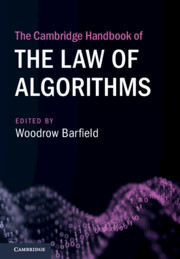Book contents
- The Cambridge Handbook of the Law of Algorithms
- The Cambridge Handbook of the Law of Algorithms
- Copyright page
- Contents
- Figures
- Tables
- Notes on Contributors
- Foreword
- Preface
- Acknowledgements
- Abbreviations
- Part I Introduction and Setting the Stage for a Law of Algorithms
- 1 An Introduction to Law and Algorithms
- 2 The Opinion of Machines
- 3 Private Accountability in an Age of Artificial Intelligence
- 4 Algorithmic Legitimacy
- 5 Understanding Transparency in Algorithmic Accountability
- Part II Business, Regulations, and Decision-Making with Algorithms
- Part III Intellectual Property and Algorithms
- Part IV Criminal Law, Tort Issues, and Algorithms
- Part V Constitutional Law, Human Rights, and Algorithms
- Part VI Applications and Future Directions of Law and Algorithms
- Index
5 - Understanding Transparency in Algorithmic Accountability
from Part I - Introduction and Setting the Stage for a Law of Algorithms
Published online by Cambridge University Press: 19 October 2020
- The Cambridge Handbook of the Law of Algorithms
- The Cambridge Handbook of the Law of Algorithms
- Copyright page
- Contents
- Figures
- Tables
- Notes on Contributors
- Foreword
- Preface
- Acknowledgements
- Abbreviations
- Part I Introduction and Setting the Stage for a Law of Algorithms
- 1 An Introduction to Law and Algorithms
- 2 The Opinion of Machines
- 3 Private Accountability in an Age of Artificial Intelligence
- 4 Algorithmic Legitimacy
- 5 Understanding Transparency in Algorithmic Accountability
- Part II Business, Regulations, and Decision-Making with Algorithms
- Part III Intellectual Property and Algorithms
- Part IV Criminal Law, Tort Issues, and Algorithms
- Part V Constitutional Law, Human Rights, and Algorithms
- Part VI Applications and Future Directions of Law and Algorithms
- Index
Summary
Transparency has been in the crosshairs of recent writing about accountable algorithms. Its critics argue that releasing data can be harmful, and releasing source code won’t be useful.1 They claim individualized explanations of artificial intelligence (AI) decisions don’t empower people, and instead distract from more effective ways of governing.2 While criticizing transparency’s efficacy with one breath, with the next they defang it, claiming corporate secrecy exceptions will prevent useful information from getting out.3
Keywords
Information
- Type
- Chapter
- Information
- The Cambridge Handbook of the Law of Algorithms , pp. 121 - 138Publisher: Cambridge University PressPrint publication year: 2020
